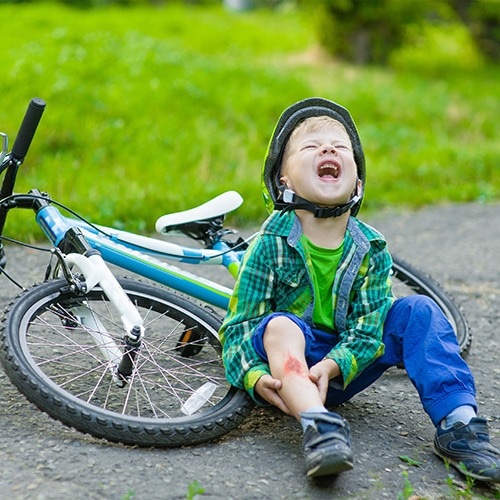Like it or not, bumps and bruises are an unavoidable part of childhood. But while no parent wants their child to feel pain, teaching children about pain when they're young can help them better understand and respond to pain when they're older.

Image Credit: University of South Australia
In a new study from the University of South Australia researchers identified five key approaches that parents and caregivers can use when talking with young children about 'everyday' pain, and that can help their recovery and resilience after injury.
In Australia, as many as one in four children, and one in five adults experience chronic pain, making it a vital topic for public health.
In this study, researchers investigated 'everyday' pains in young children (aged 2-7 years-old), asking experts from child health, psychology, development, resilience, as well as parents and educators, what they thought would promote children's recovery and resilience after minor pains or injury.
With 80 per cent consensus across all experts, the most important messages were to:
- Teach children about the meaning of pain – pain is our body's alarm system.
- Validate children's pain – ensure they feel safe, heard, and protected, but don't make a fuss.
- Reassure children after an injury - let them know that their body will heal, and the pain will pass.
- Support children's emotions – let them express themselves but encourage them to regulate.
- Involve children in their recovery – encourage them to manage their pain (eg. get a bandaid).
Lead researcher, UniSA's Dr Sarah Wallwork, says parents and caregivers likely play a critical role in helping children learn about pain.
Whether it's falling from a bike or dealing with the often-dreaded vaccinations, everyday pain experiences are opportunities for parents to promote positive pain-related beliefs and behaviors."
Dr Sarah Wallwork, Lead Researcher, UniSA
"While it's important to teach children that pain is our body's alarm system and that it's there to protect us, it's equally important to understand that pain and injury do not always align.
"As adults, one of the greatest pain management challenges is that we hold fundamental, life-long beliefs about how pain and recovery works. Often, when we get an injury, we believe that pain must follow; and conversely, if we feel pain, then we must have an injury - but as research shows, this isn't always the case.
"In children, pain can be influenced by their emotions – for example, fear, hunger, or tiredness can exacerbate symptoms, even though this is not pain itself.
"Teaching children that they can have some control over their pain - and that how they feel on the inside can influence this - empowers them to actively engage with their own pain management.
"This can be age-appropriate too. So, for a very young child, empowerment might be getting a bandaid or a wet cloth, rubbing the area and distracting them, then telling them their injury is protected by the bandaid and that it is now safe to move on and play. For an older child, the process can be more involved.
"The key is to demonstrate that the child is the healer and they that are actively involved in the healing process.
"By helping children learn about pain when they are young, we're hoping to promote lifelong 'helpful' pain behaviors that will actively encourage recovery and prevent future pain problems."
Source:
Journal reference:
Wallwork, S.B., et al. (2022) Communicating with children about ‘everyday’ pain and injury: A Delphi study. European Journal of Pain. doi.org/10.1002/ejp.2008.